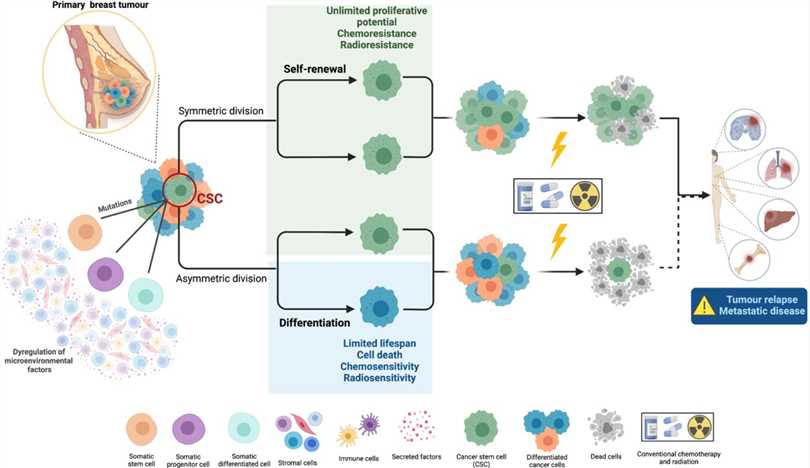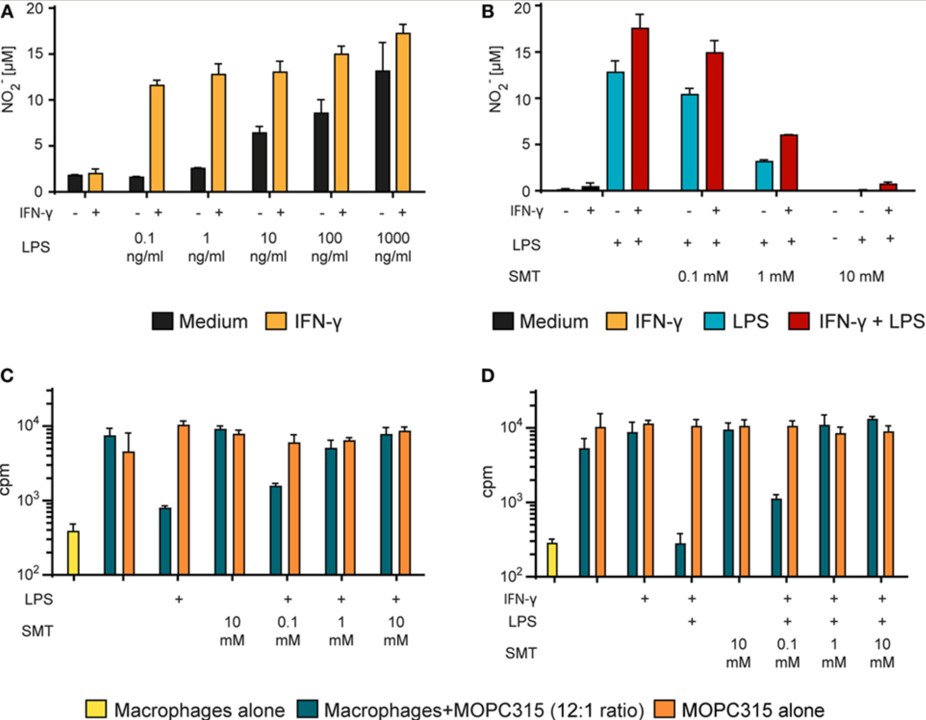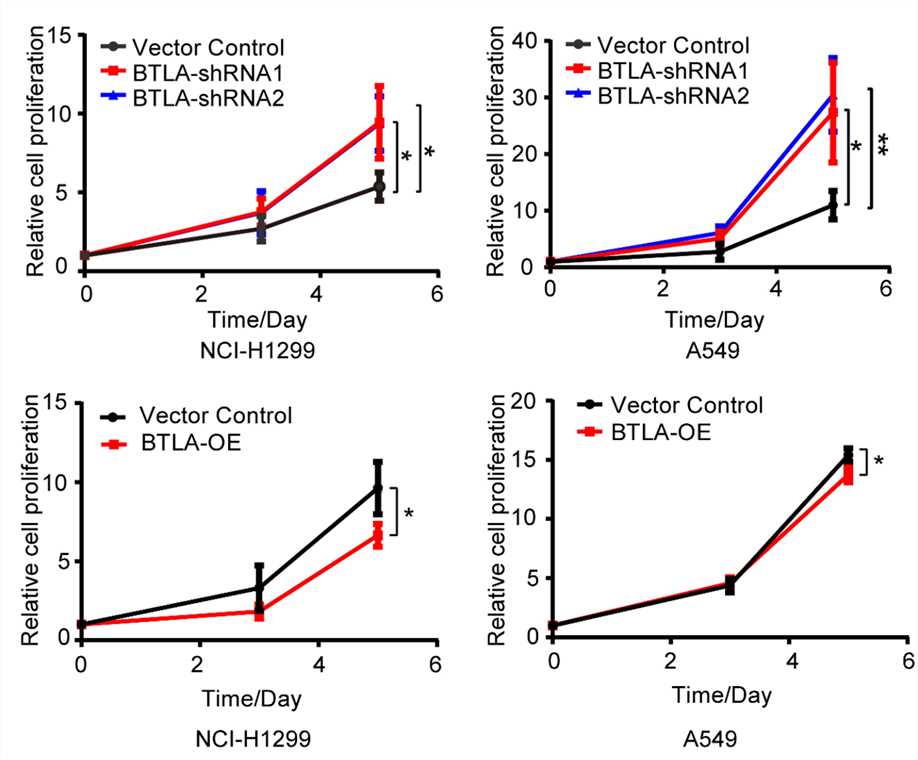Tumor Cell Proliferation Inhibition Assay Service
Tumor Cell Proliferation Inhibition Assay for Cancer Drug Discovery
Proliferation ability serves as a crucial difference between tumor cells and normal cells. Several cancer drugs have been discovered based on targeting tumor cell proliferation ability. Meanwhile, many targets related to proliferation have been focused on for a long period, such as CD73. Therefore, it is crucial to develop robust tumor cell proliferation inhibition assays for cancer drug discovery and screening.
 Fig.1 Main features of cancer stem cell (CSC) biology.1
Fig.1 Main features of cancer stem cell (CSC) biology.1
Our Tumor Cell Proliferation Inhibition Assay Service
To help global clients speed drug development, Creative Biolabs successfully developed an accurate and robust tumor cell proliferation inhibition assay service to serve as a useful solution in cancer therapy. Our tumor cell proliferation inhibition assay service measures tumor cell viability based on several methods and assay modes. Meanwhile, we also provide customized comprehensive services based on clients' special targets and project needs to deliver desirable outcomes in a rapid turnaround. We provide several approaches for global customers to perform tumor cell proliferation inhibition assay smoothly:
- Clone Formation Assay
- MTT Assay
- Vitality Staining Assay
- CCK8 Assay/BrdU Assay
- Calcein-AM/PI Double Dyeing Assay
 Fig.2 Assay workflow of our tumor cell proliferation inhibition assay service.
Fig.2 Assay workflow of our tumor cell proliferation inhibition assay service.
In addition, our tumor cell proliferation inhibition assay service can be characterized by the following advantages:

- Multiple types of tumor cell lines to choose from.
- Presented results featuring high-accurate.
- Real-time monitoring can be achieved in our tumor cell proliferation inhibition assay service.
- Our tumor cell proliferation inhibition assay service is appropriate for diverse cell types, whether it is suspension cells or adherent cells.
- We customize our service to satisfy the diverse needs of global customers.
Representative Data
Representative data 1
Background: Tumor development is influenced by the activation state of tumor-associated macrophages. Interferon-γ (IFN-γ) is a crucial cytokine in the induction of the tumoricidal M1 phenotype within macrophages. While, whether additional stimulation is needed remains unknown.
Result: The findings showed that IFN-γ alone is not sufficient to achieve the tumoricidal effects of macrophages. Similarly, stimulation of macrophages with specific TLR agonists was not effective. The results demonstrated that the combination of TLR agonists and IFN-γ increased the tumoricidal activity of macrophages and the production of pro-inflammatory cytokines (TNF-α, IL-12p40, and IL-12p70). Moreover, IFN-γ blocked the release of il-10 from TLR agonists-activated macrophages. It was also found that NO plays a role in the inhibition of tumor cell growth by activated macrophages.
 Fig.3 NO is involved in the suppression of tumor cell proliferation by activated macrophages.2
Fig.3 NO is involved in the suppression of tumor cell proliferation by activated macrophages.2
Representative data 2
Background: The B and T lymphocyte attenuator (BTLA) molecule plays a crucial role in the regulation of immunological checkpoints. In part, it helps tumor cells escape recognition by the immune system. Therefore, it is a potential therapeutic target. However, the specific mechanism by which BTLA affects tumor cells remains uncertain.
Result: This study uncovered the fascinating role of tumor cell-intrinsic BTLA/HVEM as both a tumor suppressor and an antagonist to immunotherapy. This outcome revealed that BTLA/HVEM may be used as a biomarker to identify the most suitable immunotherapeutic treatment for cancer.
 Fig.4 Tumor cell-intrinsic BTLA inhibits tumor cell proliferation.3
Fig.4 Tumor cell-intrinsic BTLA inhibits tumor cell proliferation.3
As a leader in tumor research fields, Creative Biolabs leverages extensive professional knowledge and years of invaluable experience to develop effective solutions that aid in the development of cancer drugs. If you are interested in our tumor cell proliferation inhibition assay service and want to know more details about it, please don't hesitate to reach out to us.
References
-
Conde, Inês, et al. "Breast cancer stem cell membrane biomarkers: therapy targeting and clinical implications." Cells 11.6 (2022): 934.
Distributed under Open Access License CC BY 4.0, without modification. -
Müller, Elisabeth, et al. "Toll-like receptor ligands and interferon-γ synergize for induction of antitumor M1 macrophages." Frontiers in Immunology 8 (2017): 1383.
Distributed under Open Access License CC BY 4.0, without modification. -
Cheng, Tian-You, et al. "Tumor cell-intrinsic BTLA receptor inhibits the proliferation of tumor cells Via Erk1/2." Cells 11.24 (2022): 4021.
Distributed under Open Access License CC BY 4.0. The original image was modified by extracting and using parts A and D, and the title was changed to "Tumor cell-intrinsic BTLA inhibits tumor cell proliferation".
For Research Use Only.
